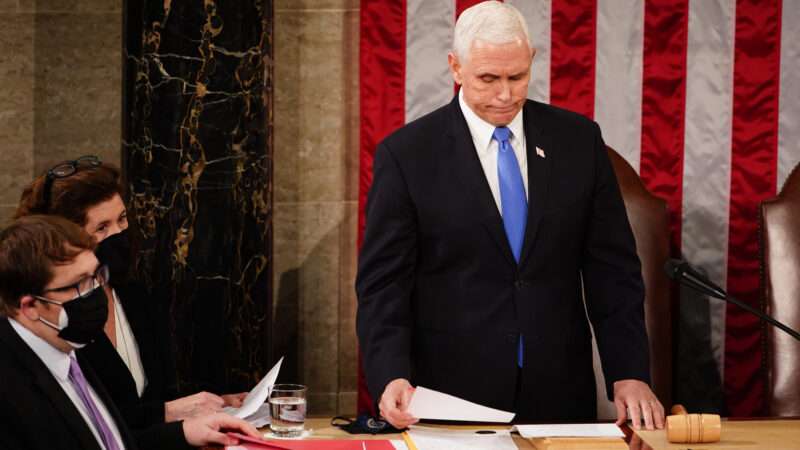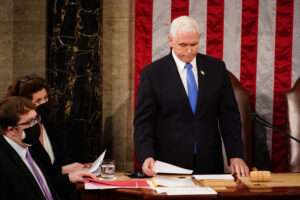

Earlier this week, a bipartisan group of 16 senators put forward a bill intended to fix the Electoral Count Act, the archaic 1887 law whose ambiguities Donald Trump and others sought to exploit in order to overturn the results of the 2020 election. The bill has a good chance of getting through Congress. If it does, it would go a long way to fixing the flaws in the ECA.
In a recent post, building on the work of Andy Craig of the Cato Institute, I summarized the three main goals ECA reform should achieve:
1. Preventing state governments from, in effect, changing the rules after election day, in order to reverse election results they don't like.
2. Preventing Congress from throwing out electoral votes for bogus reasons (as some GOP members of Congress sought to do after the 2020 election).
3. Making it more clear that the Vice-President does not have the power to invalidate electoral votes (a step then-VP Mike Pence rightly refused to take in January 2021, despite the urging of Donald Trump).
The bipartisan proposal would be a big step forward on all three points. That's why it has attracted broad, cross-ideological support from experts in the field. In a recent post at the Election Law blog, prominent election law and constitutional law scholars Ned Foley, Michael McConnell, Derek Muller, Rick Pildes, and Brad Smith, summarize the bill's strengths and urge Congress to swiftly pass it:
Here are the main features of the draft, which are a vast improvement on the existing Act from 1887. These features appropriately respond to the need to update the Act to protect the integrity of future presidential elections.
First, and most importantly, in its revisions to the current provisions of U.S. Code, the draft bill reflects the philosophy that disputes over which presidential candidate won the popular vote in a state should be settled according to that state's law, adopted in advance of the popular vote, subject, as required by the Constitution, to the supremacy of applicable federal law. As revised by the draft bill, 3 U.S.C. § 1 would now read: "The electors of President and Vice President shall be appointed, in each State, on election day, in accordance with the laws of the State enacted prior to election day." The italicized language is new, and may not be a lot of words, but it embraces the key point that the appointment of electors must be pursuant to the rule of law, and not the partisan whim of state officials disgruntled with the outcome of the popular vote….
Second, and relatedly, the draft bill would delete the existing so-called "failed election" provision in 3 U.S.C. § 2, which dangerously empowers state legislatures to choose a new method of appointing their state's electors if the election has "failed"–a term undefined in current law–in that state. Instead, the draft bill would permit states to extend the period of holding the popular vote itself in very limited circumstances: "as necessitated by extraordinary and catastrophic events as provided under laws of the State enacted prior to such day." But state legislatures have no power whatsoever for changing the rules for appointing their electors after the congressionally designated Election Day in November…
Third, the bill eliminates uncertainty about the results of a state's election or the risk of competing slates of presidential electors. Under the bill, there is only one official outcome of a presidential election in each state, and the courts have a role in ensuring that only one certificate of election is sent to Congress. The bill clarifies who has the authority to certify a slate of electors for a state, and a certification according to that process is conclusive when presented to Congress….
Fourth, the bill repairs several procedural weaknesses in how the existing Electoral Count Act structures the joint session of Congress that occurs on January 6, two weeks before Inauguration Day. It clarifies that the President of the Senate (usually, the Vice President) has a ministerial role and no unilateral power to reject election results. The bill also raises the threshold for objecting to counting electoral votes. One-fifth of the members of each chamber must sign an objection to counting electoral votes, up from the present rule that just one member of each chamber can object. This reduces the likelihood of a small number of Representatives and Senators delaying the count or interfering in results. It also specifies and limits the kind of objections that members of Congress can raise, most especially to incorporate—as spelled out in 3 U.S.C § 5—that Congress is not permitted to second-guess the results of elections after states have certified the results.
For readers who may not know, the authors of the Election Law blog post span the jurisprudential and ideological spectrum, ranging from progressive (Foley and Pildes) to conservative (McConnell), and libertarian (Smith). McConnell is also a well-known former federal judge, at times seen as a likely GOP Supreme Court nominee. I am less familiar with Muller's views than the others [update: he seems to be a moderate conservative].
The bipartisan proposal has also gotten praise from Andy Craig (whose work I mentioned above), conservative political commentator Yuval Levin in a National Review article, and others.
This is the rare bill that is not only "good enough for government work," but actually good! It won't, by any means, fix all the problems that ail American democracy. But it can fix some key vulnerabilities revealed by aftermath of the 2020 election.
UPDATE: Andy Craig has a detailed post about the bipartisan bill here:
Overall, it is a very solid proposal and would represent an immense improvement over the status quo. It tracks with many of the recommendations we've made at Cato, the work of other scholars and organizations, and includes some of the suggestions made in a Committee on House Administration staff report commissioned by Rep. Zoe Lofgren (D‑CA) earlier this year.
The whole exercise is largely one of Madisonian checks and balances: setting up guardrails to make sure the states, the courts, and Congress can each check the other two, while ensuring that each is also empowered in their proper spheres, to minimize the risk of partisan malfeasance at any stage of the process.
Craig does suggest some improvements to the current draft. And, as he notes, it may well get revised as it goes through. The most important part that needs improvement is this one:
One thing ECRA does not do is clearly limit the valid grounds for objections [to state electoral votes by members of Congress]. Instead, with a slight stylistic restructuring, it retains the language from the 1887 ECA allowing objections on the basis that electors were not "lawfully certified" or that their votes were not "regularly given." This is unfortunate and should probably be the main focus of any possible amendments.
Hopefully, Congress will fix this provision.
The post A Breakthrough on Reforming the Electoral Count Act [Updated] appeared first on Reason.com.







